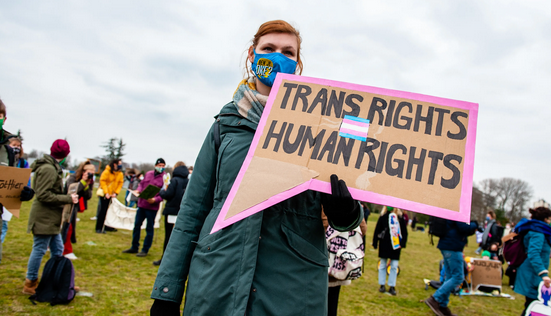
Anti-trans school sports bills are growing in number across the U.S.
Under the false premise of “preserving” women’s sports, these bills seek to further isolate transgender athletes and their achievements.
Tennessee Gov. Bill Lee announced on Friday, March 26 that he signed legislation banning transgender children from participating in middle and high school sports under their gender identity, claiming that the law would “ensure fair competition.”
Activists have already vowed to sue the state over the law, which many have described as discriminatory, harmful to transgender students.
Under the ban, student athletes would be required to show proof of the sex they were assigned at birth to participate in middle and high school sports.
In a statement posted to Twitter, Lee said he “signed the bill to preserve women’s athletics.”
He added that this law is a response to damaging federal policies that have stood in opposition to the “years of progress made until Title IX.”
But opponents have argued that the law is a direct violation of Title IX, a federal civil rights law that prohibits sex-based discrimination in schools that receive federal money.
Tennessee’s new ban is among a series of anti-transgender laws being considered in at least 20 states. Tennessee is the third state this month to pass a law banning transgender athletes from competing in girls’ sports.
Arkansas established a ban on Thursday, March 25, and Mississippi passed a similar law earlier this month.
The state House voted 81-28 on Wednesday, March 3 to pass the Mississippi Fairness Act and it was signed into law on Thursday, March 11.
I never imagined dealing with this, but POTUS left us no choice. One of his first acts was to sign an EO encouraging transgenderism in children. So today, I proudly signed the Mississippi Fairness Act to ensure young girls are not forced to compete against biological males. pic.twitter.com/INZgKQRMJr
— Tate Reeves (@tatereeves) March 11, 2021
A similar bill was introduced in the state legislature last year, but failed.
The bill was introduced by Sen. Angela Hill, who told ABC News she was inspired to introduce it after hearing about two transgender high school girls from Connecticut who won track & field championships.
Connecticut state policy allows high school athletes to compete as the gender with which they identify.
“If we do not move to protect female sports from biological males who have an unfair physiological advantage, we will eventually no longer have female sports,” Hill told reporters.
Following the House passage, Human Rights Campaign President Alphonso David said that the state was “on the wrong side of history.”
“They’re telling parents of cisgender children that you’re losing something by allowing transgender youth to play in sports. We’ve seen this playbook before – you’re losing something if you allow same-sex couples to marry, if immigration laws are respected. It’s us versus them.” https://t.co/o06bvt43kZ
— Alphonso David (@AlphonsoDavid) March 24, 2021
"There is simply no justification for banning transgender girls and women from participating in athletics other than discrimination," David said in a statement. "Like all girls, transgender girls just want to play and be part of a team with their friends. History will not look kindly on this moment in Mississippi.”
RELATED CONTENT
LGBTQ activists warn that these types of laws send a damaging message to transgender youth.
Jack Turban, a child psychiatry fellow at Stanford University made the case earlier this month that these efforts are “unconscionable attacks on already marginalized transgender children,” and that they don’t actually address a real problem.
“They’re unscientific, and they would cause serious mental health damage to both cisgender and transgender youth,” Turban said in a piece for Scientific American, entitled “Trans Girls Belong on Girls’ Sports Teams.”
Attempts to force #trans girls to play on boys sports teams are unscientific, don’t address a real problem, and will cause serious damage to both cisgender and transgender youth.
— Jack Turban MD (@jack_turban) March 16, 2021
My latest for @sciam:https://t.co/38kSVFysAA
A recent report by the Associated Press found that more than 24 state lawmakers sponsoring these bills were not able to cite examples in their own states where fairness became an issue regarding transgender girls participating in school sports teams.
Shannon Minter, prominent trans-rights attorney and legal director of the National Center for Lesbian Rights, told AP News that these multiple sports bills are addressing a “threat that doesn’t exist.”
Megan Rapinoe, star of the women’s U.S soccer team, has denounced the series of anti-trans bills as “some of the most intense political assaults on LGBTQ people in recent years.”
I'm all for addressing the real threats to women's sports. Let's start with #EqualPay, and not shutting out trans kids who just want to play the sport they love. #LetKidsPlay #TransRightsAreHumanRights https://t.co/yL8kMDGwmr
— Megan Rapinoe (@mPinoe) March 28, 2021
In an op-ed published by The Washington Post on Sunday, March 28, Rapinoe said that sports have become another avenue for legislators to attract trans rights.
The soccer champion echoed the statements of Minter, saying that “these bills are attempting to solve a problem that doesn’t exist.”
"Transgender kids want the opportunity to play sports for the same reasons other kids do: to be a part of a team where they feel like they belong," Rapinoe wrote, adding that "proponents of these bills argue that they are protecting women."











LEAVE A COMMENT: